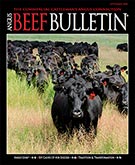Zinc’s Role in Fertility
Zinc plays vital role in animal and human fertility, can help scientists quickly diagnose infertility.
Infertility affects about 20% of the U.S. population and can be incredibly costly; it also costs the livestock industry billions of dollars each year. Researchers at the University of Missouri have found that zinc plays a key role in promoting fertility in males, a discovery that has implications for improved in vitro fertilization (IVF) and artificial insemination (AI) in livestock, and for human infertility diagnostics and therapies.
“Zinc is linked directly with fertility,” said Peter Sutovsky, a professor of animal science in MU’s College of Agriculture, Food and Natural Resources. “We have known that giving males zinc supplements — whether pigs or humans — improves fertility. Now we know that analyzing zinc signatures can help us quickly evaluate the fertilizing potential and quality of sperm.”
Scientists have long struggled to understand what regulates sperm “capacitation,” the vital physiological process sperm must undergo to become capable of fertilizing an egg cell. Sutovsky and doctoral student Karl Kerns used a state-of-the-art, image-based flow cytometer — which can take images of up to 2,000 cells per second and track biomarkers such as zinc with fluorescent dyes — to monitor zinc localization during various stages of capacitation in sperm cells. They found that zinc ions (Zn2+) exert significant control over capacitation beyond merely enabling the process, in that the ion can prevent and even reverse the capacitation process in some cases. This also occurs when an egg has already been fertilized and must defend against another fertilization.
Another product of the research was the ability to quickly and accurately evaluate the fertility of livestock or humans by analyzing their sperm cells with the flow cytometer. This allows for more informed decision-making when it comes to alternative processes like IVF and AI. For example, sperm cells are traditionally “diluted” before AI in livestock, which eliminates some of the zinc. Preserving the zinc would lead to healthier sperm and a greater ability to identify infertility.
“Infertility is a costly issue for both humans and animals,” Kerns said. “This study gives us tools to approach the problem more efficiently by demonstrating the importance of zinc — both as a mediator of fertility and as an indicator we can use to identify issues with sperm. If we could add one more pig to every litter, that would increase the income of U.S. pork farmers by $130 million per year.”
The study, “Zinc ion flux during mammalian sperm capacitation,” was published in Nature Communications. Coauthors Michal Zigo, Erma Z. Drobnis and Miriam Sutovsky of the University of Missouri were also involved in the study. Funding was provided by grants from the USDA’s National Institute of Food and Agriculture (grant number 2015-67015-23231, predoctoral fellowship award number 2017-67011-26023) and the National Institutes of Health (grant number 5 R01 HD084353-02), as well as with support from the European Development Fund, the Czech Academy of Sciences and the University of Missouri. The content is solely the responsibility of the authors and does not necessarily represent the official views of the funding agencies.
A video on the topic is available at https://vimeo.com/274729100.

Editor’s Note: Austin Fitzgerald is an editorial and science writer for the University of Missouri News Bureau.






